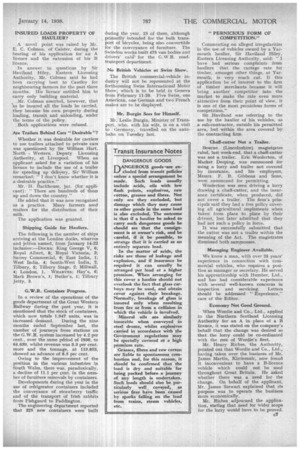Transit Insurance Notes DANGEROUS GOODS D ANGEROUS goods -are exeluded froixi
Page 5

If you've noticed an error in this article please click here to report it so we can fix it.
transit policies unless a special arrangement be made. Such loads usually include acids, oils with low flash points, explosives, raw cotton, grasses and fibres. Not only are they excluded, but damage which they may cause to other goods in the same load is also excluded. The outcome is that if a haulier be asked to carry such dangerous goods he should see that the consignment is at owner's risk, and be careful, if it be possible, to arrange that it is carried as an entirely separate load.
In the matter of acids, the risks are those of leakage and explosion, and if insurance be required it can usually be arranged per load at a higher premium. When arranging for this cover a haulier should not overlook the fact that glass carboys may be used, and obtain cover against their breakage. Normally, breakage of glass is insured only when resulting from fire or from a collision in which the vehicle is involved.
Mineral oils are similarly insurable when conveyed in steel drums, whilst explosives carried in accordance with the Government regulations may be specially covered at a high premium rate.
Grasses, fibres and raw cotton are liable to spontaneous combustion and, for this reason, it should he confirmed that the load is dry and suitable for being packed before a journey of any length is undertaken. Such loads should also be particularly well covered, as serious fires have been caused by sparks falling on the load from trains, steam vehicles, etc.


































